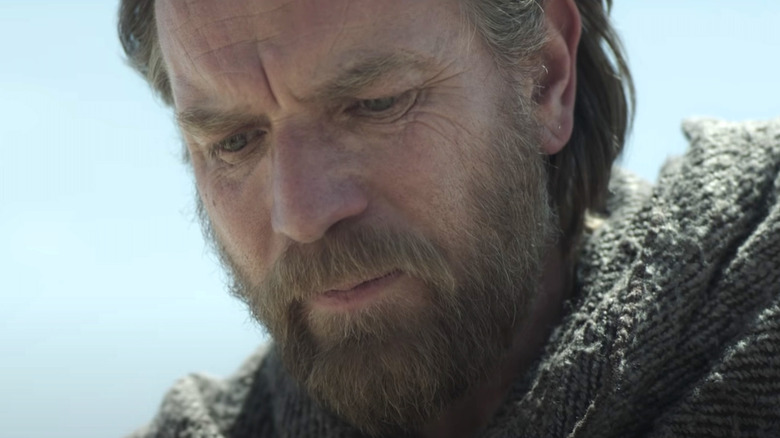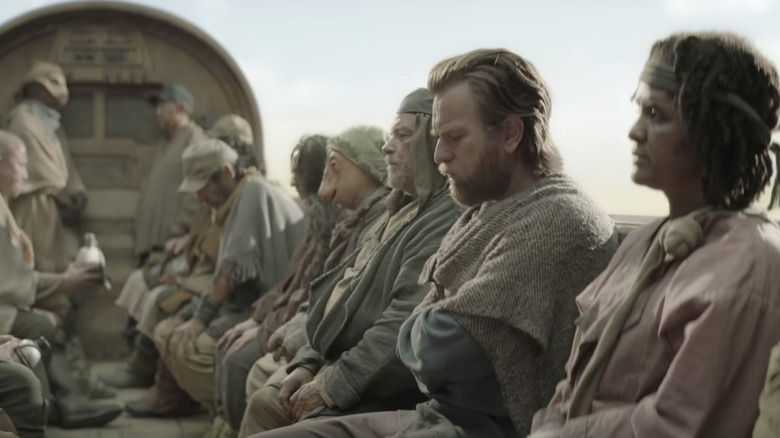Kathleen Kennedy Reveals The Real Reason Obi-Wan Kenobi Was Rewritten
In a little over two months, Lucasfilm's hotly-anticipated six-episode "Star Wars" Disney+ series, "Obi-Wan Kenobi," will finally debut on the streaming service. Fittingly, the sequel series will premiere on May 25, and, much to the delight of fans who've long held that Ewan McGregor's Obi-Wan was unjustly snuffed-out by the reception of the prequel trilogy in the Skywalker saga, reunite the defeated Jedi with his apprentice-turned-nemesis, Hayden Christensen's Darth Vader (née Anakin Skywalker).
Picking up 10 years after the events of "Star Wars: Episode III – Revenge of the Sith," the series will revolve around its titular character's exile on Tatooine, where he keeps a careful watch over the young Luke Skywalker whilst continuing to evade capture by the all-powerful Empire's deadly Jedi hunters, the Inquisitors. News of the official launch came as a relief to "Star Wars" fans everywhere, who'd been holding their breaths ever since production on the project came to a grinding halt in January 2021. At the time, Collider was one of many sites reporting the shutdown was due to Lucasfilm president Kathleen Kennedy's dissatisfaction satisfied with the scripts penned by former writer Hossein Amini.
In a recent interview with Entertainment Weekly, Kennedy finally reveals the reason behind the rewrite. Understandably, the endeavor was no small feat, particularly considering the emotional burden the series' main character of his failure to keep his protégé from falling prey to the Dark Side in "Revenge of the Sith" — an event which has disastrous, bloody consequences.
Obi-Wan Kenobi was rewritten to be more 'uplifting'
Lucasfilm head Kathleen Kennedy put it plainly that they were "looking, ultimately, to make a hopeful, uplifting story" when it came to the "Obi-Wan Kenobi" Disney+ limited series. In stating this, the possible implication here is that Hossein Amini's scripts may have been, tonally and narratively, the opposite before production shut down. She continued, "It's tricky when you're starting with a character in the state that Obi-Wan would be in."
Kennedy added that the series takes place in "a pretty bleak period of time," alluding to the fact that the limited series is set as the Empire's grip takes hold on the galaxy, nearly a decade before a grown-up Luke Skywalker (Mark Hamill) and a rebel alliance rise up to defeat it. The studio head went on to say that one can't "just wave the magic wand with any writer and arrive at a story that ... reflects what you want to feel."
Kennedy felt a re-write of the too-bleak narrative was in order and replaced Amini with Joby Harold, a co-writer of Zack Snyder's "Army of the Dead" (via Variety). Harold was hired to imbue the series with was some much-needed lightness and hope — a task the writer was more than ready to tackle. "This was a character that's always been a minor obsession of mine," Harold told the EW about Obi-Wan, noting that once he learned of the series' intended exploration of the character, he "very aggressively told them all the things (he) thought they should do."
The writer was most interested in the experiences that helped the defeated Jedi of "Revenge of the Sith" transition into the "Zen master" of "A New Hope" and began collaborating with director Deborah Chow to explore this transition. On May 25, audiences will start getting answers to this interesting question.

